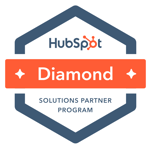%20(1).png)
There are several essential stages to navigate when implementing HubSpot. From planning and configuration to training and launch, each step is crucial in maximising the potential of this powerful marketing platform.
The first stage involves thorough planning, where businesses outline their goals, objectives, and target audience. This sets the foundation for the subsequent stages, including configuring the HubSpot platform to align with the company's needs.
The next stage focuses on data migration, ensuring a smooth transition of existing customer information into the new system.
Following this comes the training stage, where employees are equipped with the necessary skills to leverage HubSpot's capabilities effectively. Finally, the launch stage marks when the company goes live with HubSpot, ready to streamline its marketing efforts and drive growth.
Our Implementation Process
1. Introduction Meeting
2) In-depth Business Scoping Session
3) Kick-Off Meeting
We invite key stakeholders from your business to a brief meeting. This meeting brings together our scoping team and your project manager, ensuring a complete understanding of the project's nuances.
4) Implementation
The project items are assigned to our expert implementation team. Track your project in real time through our client portal, offering clarity on progress, team roles, and task timelines, ensuring seamless communication and collaboration.
5) Implementation Testing
We begin rigorous testing to ensure seamless functionality once the system is configured to your needs. At this stage, any adjustments or adaptations are considered to make sure the CRM operates like it was intended.
6) Data Migration
7) Integration
8) Best Practice Training Sessions
9) Handover Meeting
10) Ongoing Support
Why should you implement HubSpot into your business?
Imagine having all your sales and marketing tools in one place—HubSpot does just that! It brings together CRM, content creation, and email campaigns, making your life easier by saving you time and providing insights to make smarter decisions.
With HubSpot, generating leads becomes a breeze thanks to its customisable forms and CTAs. Plus, it helps you focus on the right leads with scoring and segmentation, so your marketing is always on point. By adopting HubSpot, you’ll see your marketing efforts soar, your campaigns become more effective, and your conversion rates and growth take off.
Want to learn more? Why not chat to one of our experts today?
Our Services
Here's just a few ways we can help you and your business
CRM Consultancy
By managing your sales better, you see a significant increase in leads, customer retention, conversion, and sales revenue. Businesses that use CRMs benefit from more accurate sales reporting, improved sales forecasting, and maximised ROI of their marketing campaigns.
CRM Audit
A CRM audit is a chance to review how well your systems are working and how you are managing customers. It will help you to get the most out of your management strategy by removing processes that waste time and resources and increasing profits for your business.
CRM Integrations
CRM integration focuses on connecting your CRM platform and other business software. Our goal is to provide accurate data from your business software to give you an illustration of your business and customers.
See how we helped one customer integrate their Hubspot with Timely, using Make and Open AI.
Data Migration
Companies rely heavily on databases nowadays, so it is crucial to have a reliable data migration process. This ensures that companies remain protected and that their information transfers correctly between systems.

-1.png?width=2000&height=500&name=HS%20accreditations%20(1)-1.png)